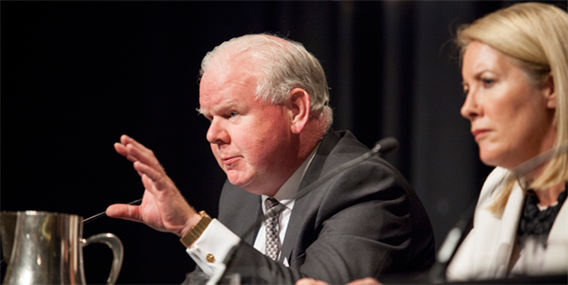-
Recently I had the privilege of speaking at an event organised by Financial Services Institute of Australia (FINSIA) to discuss ways to improve gender balance within financial services.
"The quickest way to effect change in the business community is to set measurable targets and publicly disclose results."

It was a lively conversation in front of a packed ballroom where it was agreed improving gender balance in the workplace is a business-critical issue that needs to be quickly solved.
I was joined by fellow Male Champions of Change colleagues Ian Narev and Simon Rothery along with Sex Discrimination Commissioner Elizabeth Broderick, Reserve Bank of Australia board member Kathryn Fagg and journalist Catherine Fox.
Here are four key ideas I took from the event:
Men and women need to work together
Monday was the first time I’ve been to a Male Champions of Change event where the gender divide of the audience was truly 50/50. I was pleasantly surprised as these events are usually dominated by women.
I hope this signifies a turning point where the whole business community recognises improving the gender balance of our workplaces is a critical issue that can only be solved if we have both men and women working together.
Measurement is crucial
The quickest way to effect change in the business community is to set measurable targets and publicly disclose results. This issue has been bumping along for too long and it’s time all organisations set themselves stretch targets, align remuneration to support those targets and then publicly report against them.
We are not going to get the change we need until organisations are held accountable for their progress.
We are not asking women to behave like men
Some of the media coverage implied the panel was suggesting women need to behave more like men. Nothing could be further from the truth.
An example was raised to highlight the different approaches men and women employ to provide additional context to the discussion. Improving gender balance is a business critical issue but this will be severely compromised if the only way we get progress is by encouraging women to behave like men.
Assume women are up for the challenge
A panel colleague relayed a story about an opportunity offered to one of his organisations high performing women. There was initial concern the role would have taken her away from her family commitments for too long of an extended period. They wanted her in the role and they knew she was the right person for the job. Ultimately, they gave her plenty of notice and let her decide.
Too often organisations make assumptions about a women’s willingness to take on either a promotion or a stretch role. It’s incumbent on all organisations to look at this through the same lens they would for any high potential candidate. However, we need to also put in place the necessary support structures, such as flexible work, to help make our people successful.
I’d be interested in any other feedback you have on the issues holding back companies from making meaningful progress.
The views and opinions expressed in this communication are those of the author and may not necessarily state or reflect those of ANZ.
anzcomau:Bluenotes/social-and-economic-sustainability
Four realities of workplace gender imbalance
2015-02-09
EDITOR'S PICKS
-
Gender would be irrelevant when hiring if we lived in a perfect system where unconscious and conscious bias didn’t exist. But we don’t, Jonathan Harvey writes. So what can be done?
29 January 2015
